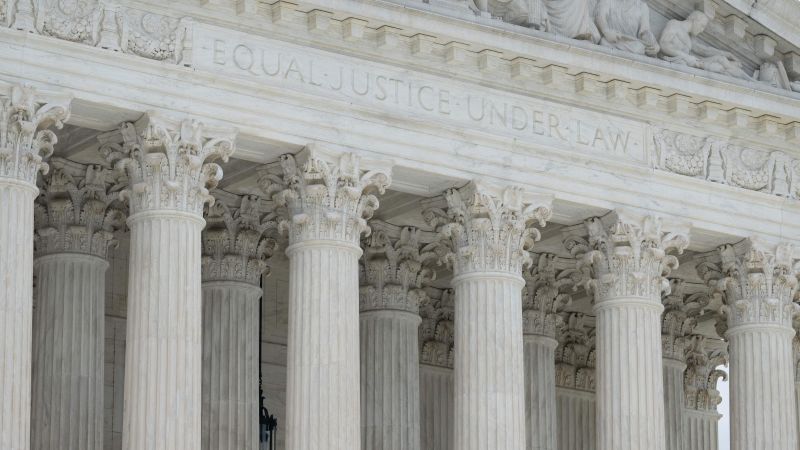
CNN
—
The Supreme Court on Thursday ruled against the Navajo Nation, dismissing a lawsuit arguing that the federal government has the legal duty under treaties signed in the 1800s to develop a plan to provide the tribe with an adequate water supply.
The ruling was 5-4 against the Navajos with Justice Brett Kavanaugh delivering the opinion of the court. Justice Neil Gorsuch, filed a dissenting opinion joined by the court’s liberal justices.
The suit pitted the Navajo Nation against the US government as well as a handful of western states that are concerned about water allocation.
Kavanaugh wrote that the case was not whether the United States has interfered with water access for the tribe, but whether a treaty required the US to take concrete steps — such as potentially building pumps, wells or other water infrastructure to facilitate better access.
“In short, the 1868 treaty did not impose a duty on the United States to take affirmative steps to secure water for the Tribe – including the steps requested by the Navajos here, such as determining the water needs of the Tribe, providing an accounting, or developing a plan to secure the needed water,” Kavanaugh wrote.
He said it is not the “Judiciary’s role to update the law,” and that it is “particularly important that federal courts not do so.”
“Allocating water in the arid regions of the American West is often a zero-sum situation,” Kavanaugh said.
“And the zero-sum reality of water in the West underscores that courts must stay in their proper constitutional lane and interpret the law (here, the treaty) according to its text and history, leaving to Congress and the President the responsibility to enact appropriations laws and to otherwise update federal law as they see fit in light of the competing contemporary needs for water,” he added.
Justice Neil Gorsuch, who often sides with tribes in legal disputes that come to the court, dissented in the case joined by the three liberal justices, Elena Kagan, Sonia Sotomayor and Ketanji Brown Jackson. Last week, Gorsuch voted with the majority leaving intact a decades old law that prioritizes the placement of Native American children with Native families.
In Thursday’s case he accused the majority of “misreading” the Navajo’s request. He said that the Navajo were not arguing that the US is “legally obligated to pay for pipelines or other aquifers” to access the water. The tribe sought only for the government to “formulate a plan” to identify the water rights it holds for the tribe. “Because there is nothing remarkable about any of this,” he said he would have allowed the case to proceed.
“Where do the Navajo go from here?” Gorsuch asked rhetorically. He said that their wait to find out the extent of their water rights, is akin to an experience “familiar to any American who has spent time at the Department of Motor vehicles.”
“The Navajo have waited patiently for someone, anyone, to help them, only to be told (repeatedly) that they have been standing in the wrong line and must try another,” he said. He said the tribes have “tried it all”, including writing federal officials, petitioning the Supreme Court and seeking to intervene in ongoing water-related litigation.
“At each turn, they have received the same answer: ‘Try again,’” Gorsuch wrote.
“When this routine first began in earnest,” Gorsuch wrote, emphasizing how long the tribes have sought help, “Elvis was still making his rounds on The Ed Sullivan show.”
The suit comes as water from the Colorado River is scarce and states located in the arid southwest are tangled in disputes concerning water allocation. The tribe claims that while the average person on the Navajo reservation uses seven gallons of water a day, that national average is 80 to 100 gallons.
The nation, which extends across Arizona, New Mexico and Utah and lies within the drainage basin of the Colorado River, has signed two treaties with the United States. In 1868, the United States promised the tribe a permanent homeland.
Shay Dvoretzky, a lawyer for the Navajo Nation, told the Supreme Court: that the Navajos “made clear” that they understood the “promise of a permanent homeland” in the 1800s to include “adequate water for agriculture and raising livestock. “Hauled from miles away, water can cost up to twenty times more than it does in neighboring off-Reservation communities,” he argued.
He said the tribe is looking for its “fair share” of water through a “fair process.”
“A promise is a solemn duty, and the United States’ duty is to see that the Nation has the water it needs and the United States promised,” he said.
The US government had argued the tribe did not have the legal right to make the claim because the treaties at issue did not create a right for the nation to sue the government over water.
Frederick Liu, an assistant to the Solicitor General, told the justices at oral arguments in March that the dispute is about “whether the United States owes the Navajo Nation a judicially enforceable affirmative duty to assess the tribe’s water needs, develop a plan to meet them and then carry out that plan by building water supply infrastructure on the reservation.”
“The answer to that question is no,” Liu said.
This story has been updated with additional details.

